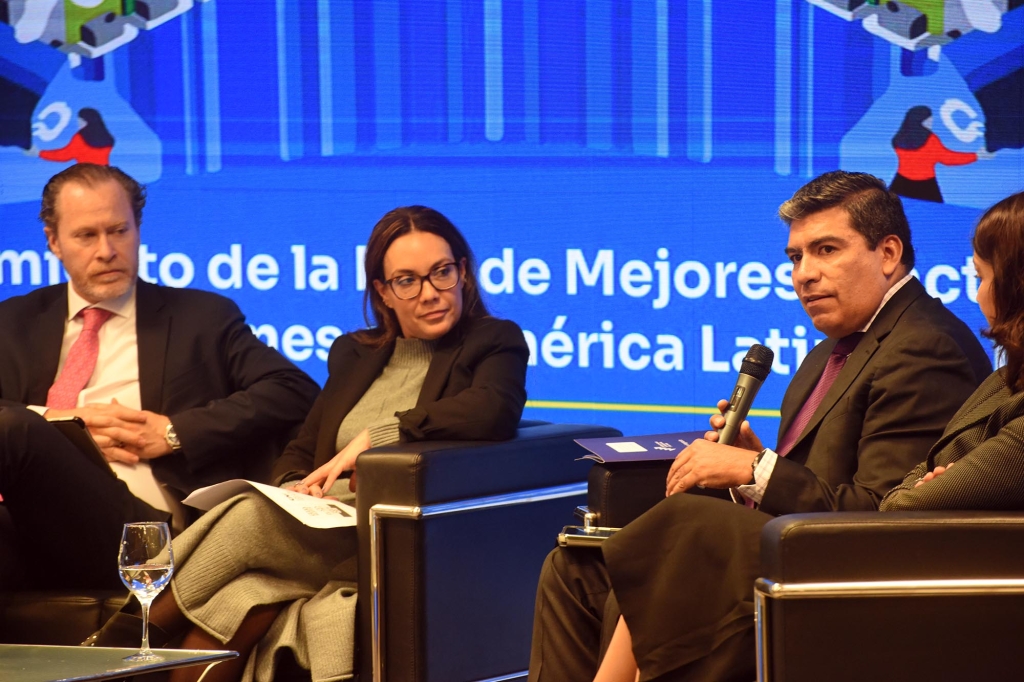
The city of Montevideo hosted the First Meeting of the Network of Best Practices on SME Policies in Latin America and the Caribbean, successfully held on 10 and 11 July by the Latin American and Caribbean Economic System (SELA), in partnership with the Organisation for Economic Co-operation and Development (OECD), CAF – Development Bank of Latin America and the Caribbean, and with the support of the Ministry of Industry, Energy and Mining of Uruguay.
Government authorities, representatives of the public and private sectors, academia, international organisations and members of civil society discussed the challenges and opportunities faced by small and medium-sized enterprises in the region, agreeing on the importance of establishing a network of best practices in public policies that favour the comprehensive development of the SME ecosystem in Latin America and the Caribbean.
During his participation in the activity, the Permanent Secretary of SELA, Ambassador Clarems Endara, highlighted the strategic importance of this network to respond to the challenges faced by SMEs. “The Network will not only be a repository of best practices. It will be a peer-to-peer accompaniment mechanism, a channel for technical dialogue, and a platform to move forward with joint assessment methodologies and subregional cooperation mechanisms,” he said. He also stressed that “public policies for MSMEs are a necessity, a national necessity and also a regional necessity,” underlining the collective nature of the effort.
Ambassador Endara also emphasised the regional potential of this initiative. “This network will help us see how we can take advantage of our own region: more than 670 million inhabitants as consumers. We are a market in itself, and we should start to see how SMEs can link up with each other,” he stated.

In addition to the Permanent Secretary of SELA, participants in this first day included the Minister of Industry, Energy and Mining of Uruguay, Fernanda Cardona; the Head of the Latin America and Caribbean Division of the OECD, José Antonio Ardavín; Luciana Rocha Mancini, Head of the Special Advisory Office for International Affairs of the Ministry of Entrepreneurship, Micro and Small Business of Brazil; the Acting Minister of Foreign Affairs of Uruguay, Valeria Csukasi; and Meyly Valdez Camino, from the Directorate for Analysis and Technical Evaluation of the Private Sector of CAF.
Also present were Carola Saavedra, Director of Communication and Projects of the Chamber of Industries of Uruguay; Juan Ignacio Dorrego, President of the National Development Agency of Uruguay (ANDE); Graciela Fernández, President of the National Institute of Cooperativism of Uruguay; Sebastián Ruiz, Manager of Business Development of ANDE; Adolfo Castejón, Chief Executive of CAF; Javier Rodríguez, Economist of the Economic Recovery Area of SELA; and Raúl Fernández, Director General of the Authority for Micro, Small and Medium Enterprises (AMPYME) of Panama.
The second day of the event, held on Friday 11 July, focused on the definition of the governance structure of the Network, as well as on the cooperation mechanisms and the construction of a shared roadmap. In this context, the technical session “Connecting solutions: launch of the Network of Best Practices for SME Policies in Latin America and the Caribbean” was held, with the aim of following up on the results of the IPPALC 2024 and gathering the initial impressions of the countries on the usefulness and potential of the Network.
The session “Boosting integration: experiences from Latin American blocs” reflected on how regional integration experiences have contributed to the strengthening of value chains and regulatory harmonisation to facilitate intra-regional trade and foster SME innovation.
This was followed by session “How to know if it works: indicators and monitoring mechanisms for SME policies,” which focused on the need to strengthen monitoring and evaluation systems. Methodologies and tools for building effective monitoring frameworks, defining key indicators and institutional capacity building were discussed.
The meeting also addressed implementation challenges in the session “From recommendation to implementation: challenges in transfer and adoption of best practices,” which identified common obstacles in the region to adopting international recommendations, as well as strategies to overcome them.
At the end of the day, the session “Final reflections and next steps for effective collaboration” made it possible to align expectations among member countries, define priority activities and move towards structured and strategic regional cooperation. The discussion served as a starting point to keep the Network active and useful, based on common needs and shared opportunities.
The First Meeting of the Network of Best Practices on SME Policies in Latin America and the Caribbean is based on the results of the Public Policy Index for MSMEs (IPPALC) 2024, an analytical tool that provides a comparative diagnosis of the policies aimed at strengthening the entrepreneurial ecosystem in the region. This initiative is part of SELA’s Work Programme for 2022-2026, specifically its programme dedicated to SMEs, which focuses on formulating public policies to promote productive sectors, strengthen business models and develop new markets with a direct impact on regional economic growth.
